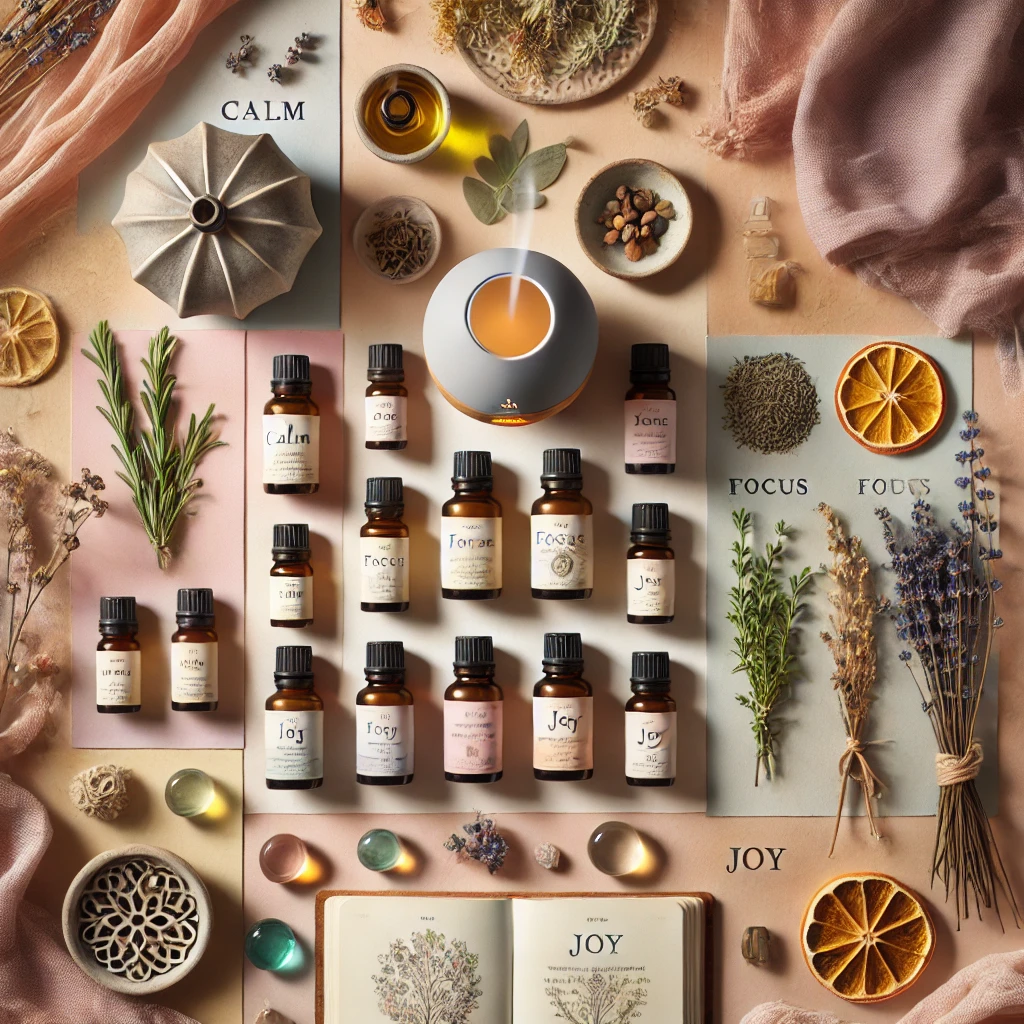Essential Oils and Emotions: A Guide to Scent-Based Mood Shifting

Share
Summary
Feeling flat, anxious, unmotivated or overwhelmed? Essential oils can do more than just smell nice — they can influence your emotions in real time. This guide shows you how different scents interact with your brain chemistry to shift your mood naturally, gently, and effectively.
We all know emotions can shift like the weather.
One minute you’re upbeat and focused, the next you’re low-energy, foggy, or irritable — and often, there’s no obvious cause. In a world full of stress, over-stimulation and hormonal flux, emotional imbalance is more common than we realise.
That’s where scent comes in.
Aromatherapy doesn’t just cover up bad vibes — it helps us move through them. With the right oils, you can create a toolkit to lift, calm, ground or energise yourself as needed — one inhale at a time.
Let’s explore how essential oils impact emotions and how you can use them to shift your mood in the moment.
How Scent Affects Emotions
The science is surprisingly simple — and incredibly powerful.
When you inhale essential oil molecules, they bind to receptors in your nose that send signals directly to the olfactory bulb, which connects to the limbic system — the brain’s emotional control centre.
This means scent bypasses logic and lands directly in the parts of your brain that manage:
- Mood
- Memory
- Motivation
- Pleasure and fear responses
One sniff can affect your nervous system, heart rate, breathing, and even hormone release — almost instantly (Herz, 2009).
Key Oils for Mood Shifting
Below are essential oils matched to specific emotional states — backed by tradition, modern aromatherapy, and research.
1. Feeling Anxious or Overwhelmed? → Try Lavender or Frankincense
- Lavender: Calms the nervous system, lowers cortisol, and promotes mental peace.
- Frankincense: Slows breathing and induces a meditative, grounded state.
Studies show lavender inhalation reduces anxiety in medical settings, including pre-surgery and dental clinics (Koulivand et al., 2013).
Quick use: Add 2–3 drops to a tissue and inhale slowly for 1–2 minutes.
2. Feeling Flat or Low Mood? → Try Bergamot or Sweet Orange
- Bergamot: A citrus oil that’s calming and uplifting — helps ease sadness without overstimulation.
- Sweet Orange: Energising and joyful; helps reintroduce a sense of play and positivity.
Research suggests bergamot oil can reduce symptoms of mild depression and lower stress hormones (Watanabe et al., 2015).
Quick use: Diffuse 3 drops bergamot, 2 drops orange in the morning.
3. Feeling Mentally Foggy or Unmotivated? → Try Peppermint or Rosemary
- Peppermint: Boosts alertness and cognitive performance.
- Rosemary: Enhances memory, concentration, and clarity.
A study found that students exposed to rosemary aroma performed better on memory tasks (Moss & Oliver, 2012).
Quick use: Inhale from a personal inhaler before work or study.
4. Feeling Scattered or Emotionally Unstable? → Try Vetiver or Sandalwood
- Vetiver: Deep, earthy, and grounding — helps with emotional regulation and focus.
- Sandalwood: Centring and soothing; excellent for high-strung nerves.
These oils support the parasympathetic nervous system, helping your body switch from stress to rest.
Quick use: Add 2 drops vetiver and 2 drops sandalwood to a roller and apply to wrists.
5. Feeling Disconnected or Numb? → Try Rose or Ylang Ylang
- Rose: Supports heart-centred emotions like compassion, empathy, and self-love.
- Ylang Ylang: Uplifts and reconnects you to sensuality and joy.
These oils help reawaken suppressed emotions in a gentle, supportive way.
Quick use: Use in a diffuser during journaling or self-reflection.
How to Use Oils for Emotional Support
✅ Inhalation (fastest effect)
- Diffuse in a water-based diffuser for 20–30 mins
- Use a tissue, cotton pad, or personal inhaler
- Apply diluted oil to collarbones or wrists and breathe deeply
✅ Topical Application
- Dilute oils (1–3%) in a carrier oil and apply to pulse points
- Great for building personal rituals and scent associations
✅ Emotional Blends & Rollers
Confidence Boost Blend
- 2 drops bergamot
- 2 drops rosemary
- 1 drop peppermint
- 10ml carrier oil
Comfort & Calm Blend
- 2 drops lavender
- 2 drops frankincense
- 1 drop rose
- 10ml carrier oil
Using Scent for Emotional Intelligence
Aromatherapy isn’t just about “fixing” how you feel — it can help you become more aware of what you’re feeling.
- Use scent to check in with yourself: What oil am I drawn to today?
- Build emotional rituals: Create a grief blend, a joy blend, a motivation blend
- Track your mood and oil preferences in a journal
- Create sensory anchors: Use the same calming scent every evening to signal rest
Final Thoughts
We often try to think our way out of an emotional state — but emotions aren’t logical, they’re sensory. That’s why essential oils are so effective. They speak the body’s language — scent — and help us shift from stress to calm, from apathy to energy, from overwhelm to focus.
With just a few drops and a bit of intention, you can use aromatherapy not just to cope — but to change your state.
Because how you feel matters. And now, you have a natural way to shift it.
Sources
- Herz, R.S. (2009). Aromatherapy facts and fictions: A scientific analysis of olfactory effects on mood, physiology and behaviour. International Journal of Neuroscience.
- Koulivand, P.H. et al. (2013). Lavender and the nervous system. Evidence-Based Complementary and Alternative Medicine.
- Watanabe, E. et al. (2015). Effects of bergamot essential oil on mood and cortisol levels. Journal of Complementary and Alternative Medicine.
- Moss, M. & Oliver, L. (2012). Plasma 1,8-cineole correlates with cognitive performance following exposure to rosemary aroma. Therapeutic Advances in Psychopharmacology.
